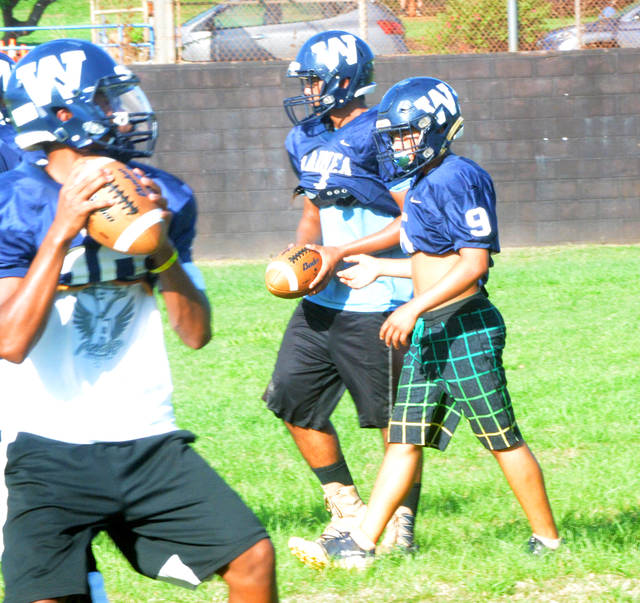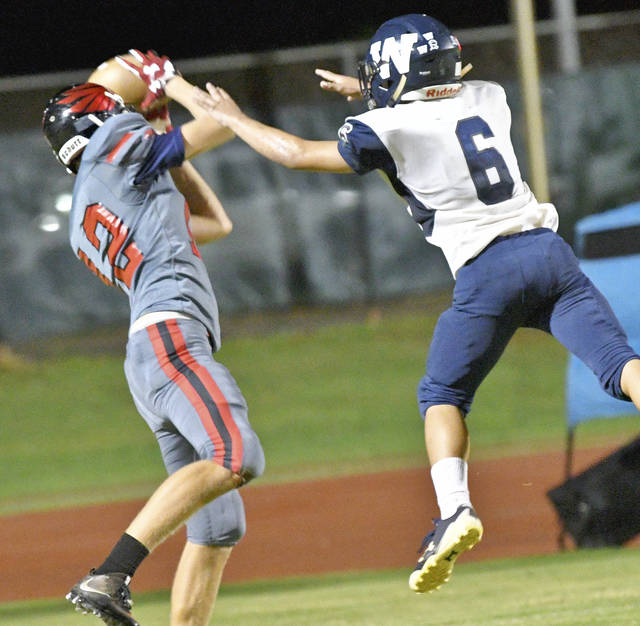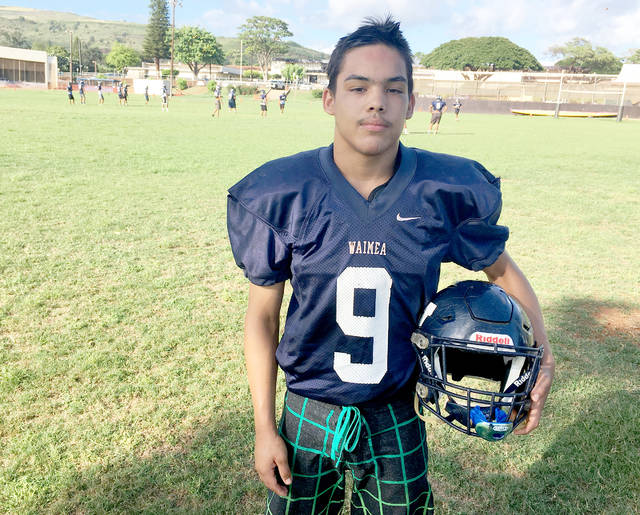WAIMEA — Listed at 5 feet, 5 inches tall and weighing 145 pounds, Waimea High School’s Isahn Ulanday isn’t exactly the biggest player on the team.
But despite that, he’s described as an “overachiever” by varsity football head coach Jason Caldeira.
“He brings a ruggedness to us whether you know it or not. He’s like Mighty Mouse. He’s fearless,” Caldeira said. “He’s a lot stronger than people think. He’s deceivingly strong and fast, and he has a good nose for the ball on defense, and I think he has some good hands on the offensive side. He brings a lot of heart and determination. He’s one of those guys that’s not going to quit.”
But the 17-year-old isn’t a typical teenager whose main concerns are school and football. He is a Type 1 diabetic.
“Type 1, it’s when your body doesn’t produce insulin,” Ulanday said. “You got to take shots to keep up with it. … You got to stay on top of it. Every time your blood goes high, you got to take a shot. If your blood gets low, you got to eat sugar, something to bring it up.”
Ulanday said if he forgets to take a shot or doesn’t eat properly, he could get lightheaded or even faint.
The second-year varsity running back and defensive back for Big Blue was diagnosed in 2011. But he’s never viewed it as life-threatening as long as he’s able to manage it.
When asked if he’s ever felt distressed or disheartened because he has diabetes, he simply said, “Not really.”
Menehune junior running back and defensive back Kawelo Huddy has been good friends with Ulanday since kindergarden.
“He’s a tough guy. He don’t back down from no challenge,” Huddy said. “He’s a funny guy. He’s one of my best friends.”
Huddy said he found out Ulanday was diabetic about five years ago.
“I felt kind of bad, but never wanted to feel bad because he’s just a normal person to me,” he said. “He’s one of my friends, so I never looked down on him.”
Huddy added: “Isahn, he really has a big heart, and I love him. He’s like a brother.”
Ulanday said he’s been playing football since he was 7.
“I have love for the game,” he said during Thursday’s practice at the school. “(I like) contact, hitting other people.”
Caldeira said there are precautions he has to be aware of with Ulanday during football activities.
“He has to prepare himself prior to that. He has to eat the right things prior to even practice,” he said. “The trainers do a really good job of keeping on that, and he does a good job. I know he had some mishaps in the past where it caused him to be really ill and even hospitalized because of it.
“He understands the severity. A year ago, I didn’t understand the severity until I got to read more about it and got to know him more, and see with my own eyes the daily struggle. That’s why I respect him so much. He’s just a kid, but I respect him a lot. He goes through more than some adults.”
Ulanday is soft-spoken and reluctant to draw attention to himself. He doesn’t want people to think he lives with a disability because he’s diabetic.
But both Caldeira and Huddy said he can be quite personable.
“Off the field, he’s just a cool cat. He’s not the most talkative, but once he gets comfortable around you, he shares a really funny side,” Calderia said. “Everybody loves him. He has so much friends. From the outside looking in, watching them all interact, it seems they all gravitate toward him. He’s just one of those guys that people genuinely likes because he’s a genuine person.”
By leading by example and by showing his toughness and grit on the football field, Ulanday has been an integral member of the team, Caldeira said.
“You never hear him complain. … He’s one of our hardest workers,” he said. “It’s very satisfying for us to see him succeed because he deserves it so much. He’s the type of kid that you never really have to yell at twice to do something. He might do something wrong every now and then, but the effort is constantly there.”
For other diabetics, Ulanday said, “Never let diabetes hold you back from whatever you like doing. Overcome it, just push through and keep it under control.”




